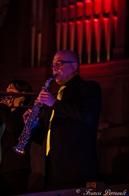 How did music enter your life?
How did music enter your life?
Since my early childhood, I was exposed to many styles of music. My father was a member of the OSM, but he also played jazz, gave concerts, and recorded with pop singers. As far back as I can remember, even while still in the crib, music was part of my life! My paternal grandmother was also one of the first pianists in Montreal’s silent movie theatres. Needless to say, I was already surrounded by music when at the age of 10, I decided to take up the clarinet in secret at the Collège St-Arsène in Montreal. I expressly told my teacher not to say a word about this to my parents for at least a year. A few years later, a family clarinet quartet we called the Quatuor Moisan was formed, and we even recorded an LP. Seven years later, I was already working professionally in Montreal recording studios, as well as giving my first concerts with the OSM as a supernumerary saxophonist!
How would you describe your experience as the Orchestre symphonique de Montréal’s principal saxophone and bass clarinet for many years?
My experience is actually truly exhilarating! The satisfaction of winning that difficult audition (we had to play six instruments!) with a jury led by Charles Dutoit was really a high point which resonates to this day. Having the privilege of playing with an orchestra of such high calibre, on all the instruments of the clarinet and saxophone families, is remove comma quite simply, a pure delight! And since there is a great variety of conductors and repertoire, every week is different!
You have added the role of conductor to your impressive resume. Please tell us a little about the process of becoming a conductor.
After having studied conducting and attended several masterclasses with the likes of Seiji Ozawa and Pierre Boulez, I had the wonderful opportunity of closely observing some of the world’s best conductors, such as Zubin Mehta, Valéry Gergiev, Leonard Bernstein, and of course Charles Dutoit, whose well-planned working methods I diligently noted. My idols were Bernstein and Ansermet, for their combined qualities as conductors and pedagogues, which I think are essential. Conducting increasingly more rehearsals and concerts here and abroad, my reputation gradually grew, and it was Charles Dutoit himself who gave me my first opportunity to conduct the OSM in 1998, even before I won my audition in 1999! I was able to propose original programming and conduct, from 1998 to 2008, the Youth Concerts and several of the concerts on the Sunday Family series. It’s a rare privilege to conduct one’s own colleagues!
It used to be that classical musicians did not want to be labelled as “eclectic,” but you seem comfortable with the description. Why?
I think that description suits me perfectly. Remember that I was influenced at home by Beethoven, Chopin, and Mozart, as well as by greats like Charlie Parker, Maynard Ferguson, and Dizzy Gillespie! That really opens the mind and develops musical taste. And then there’s my high school teacher, Raymond Grignet, who played clarinet with the Cincinnati Opera and who influenced more than one young Quebec musician. He had us listen to all kinds of music during our lunch hour, such as Shostakovich, Stravinsky, and Blood, Sweat and Tears… Later on, my tastes evolved and I could never limit myself to a single style of music, though there was a focus on classical music, which shaped my overall musical development and technique.
When did you first begin exploring klezmer music?
I progressed from listening to playing this moving and lively music and eventually included several pieces with piano in my solo repertoire. This went on gradually until I discovered Giora Feidman at a concert he gave in Montreal. Simply fantastic! It was an emotional shock that had a great impact on me, especially after going to see him in his dressing room, where I discovered an affable, uncomplicated human being. He’s a great master of klezmer music, not to mention his total and mesmerizing command of the clarinet and bass clarinet. For me, Giora perfectly embodied eclecticism—he had been Principal Clarinet of the Israel Philharmonic for several years! He had classical training, a classical career, but that carried over to other interests. Curiously, we met again in Paris at a Radio-France event, and I promised to dedicate a piece written in his honour (Sholem Alekheim) to him, which I perform on this new CD with the pianist Jean Saulnier. You can also listen to my quintet arrangement of this piece on my album Impressions, released just last June on ATMA, in which I am accompanied on the organ of the Maison Symphonique de Montréal and by three exceptional musicians! A different colour altogether!
How did you select these particular composers’ works for Klezmer Dreams, and what makes klezmer music relevant to today’s listeners?
Klezmer music is essentially a music of the moment, always very lively and ever-changing. Expressing in turn pain, joy, and spirituality, I consider it to be a perfect channel for human and divine emotion. One need only listen and be immersed in it to be convinced. I chose the pieces for the emotional impact they have on me, both as a listener and as a performer. When you play a piece day after day with such joy and emotion, it surely means something. I simply wished to share this with audiences by choosing a number of personal favourites, and adding a novelty: a commissioned work by my former pupil Airat Ichmouratov. I met Airat when he first arrived from Russia to study with me at the Orford Arts Centre and later at the Université de Montréal, where he completed a Masters in clarinet and later in conducting. Airat is a great performer of klezmer music, as well as a clarinettist and a composer. Who better to compose a work inspired by klezmer music, one that is also very erudite, with obvious influences from the likes of Prokofiev and Shostakovich?
How have your musical tastes changed over the course of your forty-year career?
Honestly, I think that my vision has expanded to include more pop singers from all over, more singer-songwriters, as well as Indian, Buddhist, Japanese, and other world musical cultures. I enjoy not setting limits to what I listen to, including music for meditation, which if it is well written, can have surprising power over our emotions and psyche. As you can see, my problem is perhaps that being so open, it’s impossible to categorize me as a musician of a single style.
What projects are you working on next?
I am on the lookout for 19th-century salon concert repertoire for clarinet and various combinations of instruments, and we are also preparing an album of Brazilian music with an exceptional singer. As you can see, eclecticism is my daily bread! And that’s just the tip of the iceberg. I have several other projects for the coming years, which include electronic and digitally processed music.
